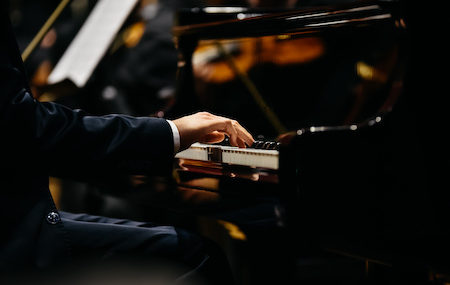If you’ve decided to learn to play the piano, a recital may be in your future. It’s an important step in your learning process to help you perfect your piano playing skills.
Of course, not everyone revels in the idea of being in a performance situation. For some, piano performance anxiety can be a debilitating thing.
Are you gearing up for a recital? A touch of nervousness can often accompany the anticipation and excitement, and that’s perfectly normal! Whether you’re an aspiring pianist or a seasoned performer, stage jitters can affect anyone.
It’s how you approach the day that matters most.
Before Your Recital:
Start Preparing Early
Being prepared cuts down performance anxiety. Start early to ensure enough time to practice and refine your piece. Rushing through your practice sessions can lead to added stress. Make a schedule, break your piece into manageable sections, and work on them consistently. Gradual progress will boost your confidence and reduce anxiety.
Don’t Overpractice
While practice is essential, be cautious not to overdo it. Excessive practice can lead to physical and mental fatigue, making you more prone to mistakes during the recital. Aim for quality over quantity in your practice sessions. Take breaks, stay hydrated, and listen to your body.
Look Your Best
Dressing the part can have a significant impact on your confidence. Choose an outfit that makes you feel comfortable and confident. Feeling good about your appearance can boost your self-assurance, allowing you to focus on your performance rather than worrying about your attire.
Rehearse in the Recital Location
Familiarize yourself with the recital location. If possible, practice on the actual piano you’ll be performing on. Getting accustomed to the venue’s acoustics, lighting, and surroundings can help reduce anxiety on the big day. Invite a friend or family member to listen and provide feedback to simulate a real performance environment.
At the Recital
Warm Up
Just as athletes warm up before a game, pianists should warm up before a recital. Start with some gentle scales or a piece you’re comfortable with to get your fingers and mind in sync. This helps to ease any initial nervousness and ensures a smoother start to your performance.
Breathe
Deep breathing exercises can be your best friend when dealing with performance anxiety. Take a few moments backstage to close your eyes, inhale deeply through your nose, hold your breath for a few seconds, and exhale slowly. This simple practice can help calm your nerves and improve focus.
Pay Attention to Your Performance, Not the Audience
It’s natural to be aware of the audience, but try redirecting your focus to your music. Concentrate on the emotions and story behind your piece. When you immerse yourself in the music, you’ll find that you’re less preoccupied with the people watching you.
Channel How You Play at Home
Think of your performance as an intimate conversation with your piano, just like when you practice at home. This mental shift can make the stage feel less intimidating. Imagine you’re in your comfort zone, playing for yourself and your love of music.
Have Fun
Remember why you started playing the piano in the first place – because it’s enjoyable! Embrace the joy of making music, and let that passion shine through in your performance. When you’re having fun, your nervousness is less likely to take center stage.
Realize We All Have Bad Days – Try and Try Again!
Finally, understand that even the most seasoned pianists have off days. It’s part of the journey. Don’t be too hard on yourself if things don’t go perfectly. The key is to keep trying and learning from your experiences. Each performance, whether good or not-so-good, contributes to your growth as a pianist.
As you face your nerves head-on, you’ll find that the stage becomes your canvas to express your musical artistry. So, embrace the challenge, and let your passion for the piano shine through every note you play. Good luck!


